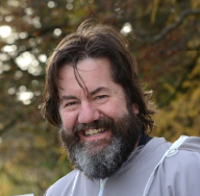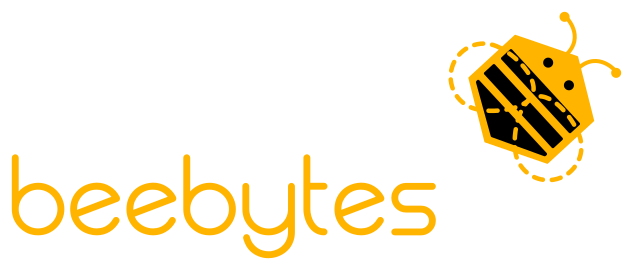beebytes team

DR MARK BARNETT
A Scottish Expert Beemaster and honey bee research scientist. He has given many public lectures on honey bee research and has found that there is great interest in honey bees amongst the general public and substantial interest in honey bee science amongst beekeepers. In 2019, he was awarded the “Inspiring Public Engagement Activity Award” by the Roslin Institute. He manages the apiary at the Easter Bush Campus of the University of Edinburgh and is the President of Edinburgh and Midlothian Beekeepers Association. Each year, he teaches on three beekeeping courses for beginners and teaches courses to help beekeepers prepare for the Basic Beekeepers Certificate and the Beekeeping Module exams. He is responsible for the Scottish Beekeepers Association Microscopy Certificate, Intermediate and Advanced Practical exams.

MATTHEW RICHARDSON
Manager of the University of Edinburgh Apiary Project at the King’s Buildings (Science and Engineering) campus, which supports research and teaching work related to bees and beekeeping. He is the Science and Health Officer on the board of the Scottish Beekeepers’ Association, and has a strong theoretical and practical background in beekeeping, having qualified as a Scottish Expert Beemaster. He is also an examiner for the Basic Beekeeping Certification programme. Matthew is responsible for managing swarm control within Edinburgh and the Lothians, and has written a web-app (beedentify) to allow the general public to identify the bees and wasps they encounter.His background is in software engineering, with particular focus on ‘big data’ management and analysis, as well as application and website design.

DR DAVID WRAGG
A research scientist with expertise in statistical genetics and bioinformatics. While employed at the Institut National de la Recherche Agronomique, he lead the analyses on a project to characterise honey bee population genetics throughout France. Following which he joined the Roslin Institute where his interest in honey bee genetics led to interactions with Mark and Matthew, and ultimately the formation of Beebytes. He has authored a number of scientific articles on various livestock species including honey bees. The breadth of this research includes characterising population genetic structure and admixture, identifying genetic associations for traits under selection, environmental adaptation, modeling gene-gene interactions and differences in gene expression in response to genotype and stimuli.
Publications
Valentine, A., Moro, A., … Richardson, M., Wragg, D., …, Barnett, M., NIHBS, McCormack, G. P. (2024) Introgressive hybridisation puts the distinctive population of Apis mellifera mellifera in Ireland at risk: evidence from a multidisciplinary approach. Journal of Apicutltural Research
Patir, A., Raper, A., Fleming, R., … Barnett, M. W. (2023) Cellular heterogeneity of the developing worker honey bee (Apis mellifera) pupa: a single cell transcriptomics analysis. G3
Buswell, V. G., Ellis, J. S., … Wragg, D., Barnett, M.W., et al. (2023). When one’s not enough: Colony pool-seq outperforms individual-based methods for assessing introgression in Apis mellifera subspecies. Insects
Parejo, M., Talenti, A., Richardson, M., Vignal, A., Barnett, M., Wragg, D. (2023). AmelHap: Leveraging drone sequence data to create a honey bee HapMap. Scientific Data
Wragg, D., Eynard, S. E., Basso, B., Canale-Tabet, K., et al. (2022) Complex population structure and haplotype patterns in Western Europe honey bee from sequencing a large panel of haploid drones. Molecular Ecology Resources
Parejo, M., Wragg, D., Henriques, D., Charrière, J.-D., et al. (2020). Digging into the genomic past of Swiss honey bees by whole-genome sequencing museum specimens. Genome Biology and Evolution
Regan, T., Barnett, M.W., Laetsch, D.R., Bush, S.J., Wragg, D., et al. (2018). Characterisation of the British honey bee metagenome. Nature Commuications
Henriques, D., Browne, K.A., Barnett, M.W., Parejo, M., et al. (2018). High sample throughput genotyping for estimating C-lineage introgression in the dark honeybee: an accurate and cost-effective SNP-based tool. Scientific Reports
Henriques, D., Parejo, M., Vignal, A., Wragg, D., et al. (2018). Developing reduced SNP assays from whole-genome sequence data to estimate introgression in an organism with complex genetic patterns, the Iberian honeybee (Apis mellifera iberiensis). Evolutionary Applications
Wragg, D., Techer, M.A., Canale-Tabet, C., Basson, B., et al. (2017). Autosomal and mitochondrial adaptation following admixture: a case study on the honeybees of Reunion Island. Genome Biology Evolution
Parejo, M., Wragg, D., Vignal, A., Henriques, D., et al. (2017). Genome-wide scans between two honeybee populations reveal putative signatures of human-mediated selection. Animal Genetics
Parejo, M., Wragg, D., Gauthier, L., Vignal, A., et al. (2016) Using whole-genome sequence information to foster conservation efforts for the European dark honey bee, Apis mellifera mellifera. Frontiers in Ecology and Evolution
Wragg, D., Marti, M., Basso, B., Bidanel, JP., et al. (2016) Whole-genome resequencing of honeybee drones reveals genomic selection in populations managed for royal jelly. Scientific Reports
